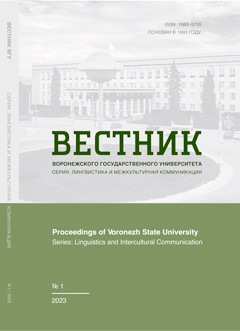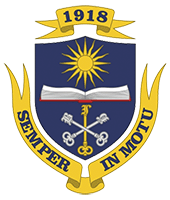Музыкообразующие отношения в художественных текстах Э. Бёрджесса
Аннотация
Настоящая статья посвящена определению пути музыки от композитора к слушателю в художественных текстах Энтони Бёрджесса. Цель настоящей работы заключается в выявлении и описании специфики музыкообразующих отношений в текстах художественных произведений Э. Бёрджесса. В качестве эмпирического материала были использованы тексты художественных произведений Э. Бёрджесса. Предметом исследования являются лексические единицы, номинирующие композитора, исполнителя и слушателя / адресата музыки. В процессе исследования применялись следующие методы: метод контекстуального анализа, метод компонентного анализа с опорой на словарные дефиниции. В ходе работы было установлено, что наряду с субстантивными лексическими единицами, использующимися для репрезентации композитора, исполнителя и слушателя, в текстах анализируемых произведений присутствуют имена собственные, а также дейктические средства (личные местоимения). Характерно, что дейктические средства наблюдаются преимущественно при указании слушателя, что, главным образом, объясняется превалированием местоимения I в качестве адресата музыки в романе «Заводной апельсин», поскольку повествование в нем ведется от первого лица. Исследование показало, что выявленные антропонимы делятся на имена реально существующих музыкантов и фиктивные онимы. С позиции оценочности отмечается положительная коннотация реальных имен собственных и негативная окраска вымышленных имен, прослеживающаяся как в процессе их этимологического анализа, так и на примере лексического окружения. Делается вывод о том, что для художественных текстов Э. Бёрджесса релевантным является коммуникативный музыкальный треугольник «Композитор – Исполнитель – Слушатель». Практическая значимость работы заключается в возможности использовать результаты проведенного исследования в теоретических курсах по лексикологии и стилистике английского языка, межкультурной коммуникации, лингвокультурологии, когнитивной лингвистике.
Скачивания
Литература
2. Serkova N. I. Predposylki chleneniya teksta na sferfrazovom urovne [Prerequisites for Text Membership at Spherical Level]. In Voprosy yazykoznaniya. 1978. No. 3. Pр. 75–82.
3. Otkupshchikova M. I. Sintaksis svyaznogo teksta [Syntax of the connected text]. L. : Izd-vo LGU, 1982. 10 p.
4. Boruhov B. L. Ontologiya hudozhestvennogo teksta [Ontology of the literary text]. In Hudozhestvennyj tekst: ontologiya i interpretaciya. Saratov : SGPI, 1992. Pр. 4–16.
5. Asaf’’ev B. V. Muzykal’naya forma kak process [Musical Form as a Process]. L.: Muzyka, 1971. 376 p.
6. Yavorskij B. L. Izbrannye trudy : v 2-h tt. [Selected works: in 2 vol.]. In T. 1. Stat’i, vospominaniya, perepiska. Moscow: Sovetskij kompozitor, 1972.
7. Shmit F. I. Iskusstvo. Osnovnye problemy teorii i istorii [Art. Main problems of theory and history]. L. : Muzykal’nyj sektor, 1925. 184 p.
8. Cypin G. M. Psihologiya muzykal’noj deyatel’nosti: problemy, suzhdeniya, mneniya [Psychology of Musical Activity: Problems, Judgements, Opinion]. Moscow: Vlados, 1994. 373 p.
9. Teplov B. M. Psihologicheskie voprosy hudozhestvennogo vospitaniya [Psychological issues of art education]. In Izvestiya APN. 1947. No. 11. Pр. 7–26.
10. Dubrovskaya E. A. Muzykal’noe razvitie detej v triade «kompozitor ispolnitel’ slushatel’» [Musical development of children in the triad “a composer a per- former a listener”]. In Vestnik MGPU. Seriya «Pedagogika i psihologiya». Moscow, 2008. No. 4 (29). Pр. 54–60.
11. Burgess A. Earthly Powers. Random House, 2012. 656 p.
12. Burgess A. Sily zemnye [Earthly Powers]. URL
13. Burgess A. One hand clapping. Bloomsbury Publishing, 2015. 80 p.
14. Byordzhess E. Odnorukij aplodisment [One hand clapping]; per. s angl. E. V. Netesovoj. Moscow: Centrpoligraf, 2002. 223 p.
15. Korobko L. V. Imya Lyudviga van Bethovena kak precedentnaya edinica v romane E. Byordzhessa «Zavodnoj apel’sin» [Ludwig van Beethoven’s name as a case unit in A. Burgess’s novel «A Clockwork Orange«]. In Vestnik Kemerovskogo gosudarstvennogo universiteta. 2017. No. 1. Pр. 169–177.
16. Burgess A. A Clockwork Orange. KARO, 2015. 288 p.
17. Burgess A. Zavodnoj apel’sin [A Clockwork Orange]; per. s angl. V. Boshnyaka. AST, 2010. 226 s.
18. Arutyunova N. D. Tipy yazykovyh znachenij: Ocenka. Sobytie. Fakt [Types of language values: Assessment. Event. Fact]. Moscow : Nauka, 1988. 341 p.
19. The Longman Dictionary of Contemporary English Online. URL
20. Behind the name : the etymology and history of first names. URL
21. Burgess A. Tremor of Intent. W. W. Norton & Company, 2013. 272 p.
22. Burgess A. Trepet namereniya [Tremor of Intent]; per. s angl. A. D. Smolyanskij. AST, 2010. 320 p.
23. Korobko L. V. Etimologicheskie i transkul’turnye sostavlyayushchie fiktivnyh imyon muzykantov i nominacij muzykal’nyh grupp (na materiale romana Entoni Byordzhessa «Zavodnoj apel’sin») [Etymological and transcultural components of fictitious names of musicians and nominations of bands (based on the novel of Anthony Burgess «A Clockwork Orange»)]. In Nauchnyj vestnik Voronezhskogo gosudarstvennogo arhitekturno-stroitel’nogo universiteta. Ser. Sovremennye lingvisticheskie i metodiko-didakticheskie issledovaniya. 2016. No. 2 (30). Pр. 135–150.













